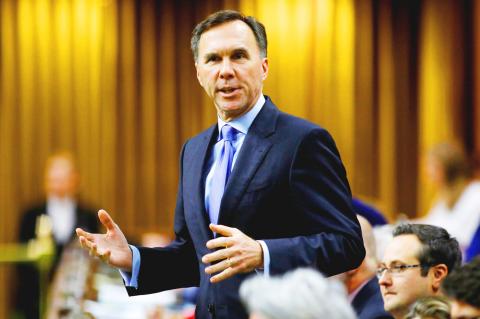Canada is to impose a levy on Internet giants such as Amazon.com Inc, Google and Facebook Inc similar to France’s digital services tax that created tensions with Washington, two ministers said on Monday.
“We’ve been very clear that we want to make sure that digital companies pay their fair share of taxes in our country,” Canadian Minister of Finance Bill Morneau told reporters.
“That means we will move forward,” he said.

Photo: Reuters
Canadian Prime Minister Justin Trudeau, during an election campaign that returned his Liberals to power in October, called for a 3 percent tax on digital companies with Canadian revenue of at least C$40 million (US$30 million) and worldwide income topping C$1 billion.
A tax on online advertising and user data starting as early as April 1 next year would put an estimated C$540 million in government coffers in the first year, rising to C$730 million by fiscal year 2023-2024, the party’s election platform said.
Minister of Canadian Heritage Steven Guilbeault said that Ottawa intends to roll out the tax “in the shortest amount of time possible,” without specifying an exact time line.
Both ministers pointed to ongoing Organisation for Economic Co-operation and Development (OECD) negotiations on international taxation, saying they hoped for a multilateral consensus.
Washington has said that the OECD talks are key to resolving the taxation issue and has threatened to impose tariffs on French products over that nation’s digital services tax.
The French tax imposes a 3 percent levy on revenue earned by technology firms in France.
It targets revenue instead of profit, which is often reported by technology giants in low-tax jurisdictions such as Ireland or Luxembourg in a practice that has enraged other governments.
Separately, officials from the US, Canada and Mexico were to meet in Mexico yesterday for talks on a new continent-wide trade deal after US President Donald Trump hinted that efforts to push the pact through the US Congress were close to success.
The talks follow a report that US and Mexican trade negotiators reached an agreement making changes to labor enforcement under the US-Mexico-Canada Agreement signed last year.
That would remove a principal hurdle to ratification of the deal, the fate of which had seemed precarious.
“I am hearing very good things,” Trump said on Monday.
“I am hearing a lot of strides have been made over the last 48 hours,” he said.
US Trade Representative Robert Lighthizer and senior Trump adviser Jared Kushner, the president’s son-in-law, were expected to visit Mexico yesterday, the Washington Post reported.
Canadian Deputy Prime Minister Chrystia Freeland — the nation’s lead negotiator — was also headed to Mexico for meetings on the pact, her office said.
Trudeau earlier on Monday said that the chances of a deal were looking up.
“We’re working hard and hopeful it will get to ratification soon,” Trudeau said.

The US dollar was trading at NT$29.7 at 10am today on the Taipei Foreign Exchange, as the New Taiwan dollar gained NT$1.364 from the previous close last week. The NT dollar continued to rise today, after surging 3.07 percent on Friday. After opening at NT$30.91, the NT dollar gained more than NT$1 in just 15 minutes, briefly passing the NT$30 mark. Before the US Department of the Treasury's semi-annual currency report came out, expectations that the NT dollar would keep rising were already building. The NT dollar on Friday closed at NT$31.064, up by NT$0.953 — a 3.07 percent single-day gain. Today,

‘SHORT TERM’: The local currency would likely remain strong in the near term, driven by anticipated US trade pressure, capital inflows and expectations of a US Fed rate cut The US dollar is expected to fall below NT$30 in the near term, as traders anticipate increased pressure from Washington for Taiwan to allow the New Taiwan dollar to appreciate, Cathay United Bank (國泰世華銀行) chief economist Lin Chi-chao (林啟超) said. Following a sharp drop in the greenback against the NT dollar on Friday, Lin told the Central News Agency that the local currency is likely to remain strong in the short term, driven in part by market psychology surrounding anticipated US policy pressure. On Friday, the US dollar fell NT$0.953, or 3.07 percent, closing at NT$31.064 — its lowest level since Jan.

The New Taiwan dollar and Taiwanese stocks surged on signs that trade tensions between the world’s top two economies might start easing and as US tech earnings boosted the outlook of the nation’s semiconductor exports. The NT dollar strengthened as much as 3.8 percent versus the US dollar to 30.815, the biggest intraday gain since January 2011, closing at NT$31.064. The benchmark TAIEX jumped 2.73 percent to outperform the region’s equity gauges. Outlook for global trade improved after China said it is assessing possible trade talks with the US, providing a boost for the nation’s currency and shares. As the NT dollar

The Financial Supervisory Commission (FSC) yesterday met with some of the nation’s largest insurance companies as a skyrocketing New Taiwan dollar piles pressure on their hundreds of billions of dollars in US bond investments. The commission has asked some life insurance firms, among the biggest Asian holders of US debt, to discuss how the rapidly strengthening NT dollar has impacted their operations, people familiar with the matter said. The meeting took place as the NT dollar jumped as much as 5 percent yesterday, its biggest intraday gain in more than three decades. The local currency surged as exporters rushed to